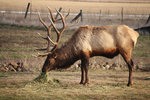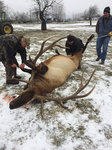

ELLENSBURG — It was midmorning when Leon Mankowski was outside his home putting up Christmas lights last Dec. 1.
It was a Tuesday. When you’re 71 and retired from the Puget Sound Naval Shipyard, you decide when you feel like putting up holiday decorations.
Mankowski remembers that day well.
Suddenly he’s hearing shots. “KABOOM!” he remembers.
By the second shot he has a pretty good idea of what’s going on.
Bullwinkle — the bull elk that had become a local celebrity, the elk that didn’t mind at all when gawkers drove up to the hayfields to photograph him and his buddies — has been killed.
As the state’s Department of Fish & Wildlife puts it, sure the five bull elk in the group were considered wild, but they also had “habituated to valley life,” the laid-back life in the farm fields and among the fruit trees.
“This was murder, plain and simple,” says Mankowski about the wealthy hunter charged with shooting Bullwinkle.
“I’m guessing he probably got 50, 60 feet away from that elk when he shot him. Now that’s hunting, in the middle of a field? Disgusting is what it is.”
Mankowski is referring to Tod Reichert, 76, a self-made entrepreneur from Salkum, a tiny unincorporated community in Lewis County.
Reichert made his fortune by starting a shake mill from scratch in the 1970s with a three-man crew, says the website for Reichert Shake & Fencing.
He has spent $214,200 since 2007 for auction trophy permits in this state, with the big chunks being $47,000 in 2007; $50,000 in 2015 for an elk hunt in Eastern Washington; and $75,000 for the same hunt in 2016, according to state and court records.
The state says its auctions generate money for “the management of the hunted species.” Critics wonder about the ethics of selling a public hunt to the highest bidder.
This is not the first time that Reichert has faced hunting-related charges in this state.
In 2012 he pleaded guilty to interfering and giving false information five years earlier to a U.S. Forest Service officer regarding an elk hunt in the Umatilla National Forest. He was fined $5,000 and agreed not to hunt in national forests for two years.
In that case, Reichert had used an outfitter not authorized to provide guide services in that forest and was not truthful about it. The outfitter also used a helicopter to spot the elk, a crime in this state.
In the Bullwinkle case, Reichert faces criminal charges of unlawful hunting of big game in the second degree.
According to a report from the state’s Fish & Wildlife police, Reichert shot Bullwinkle in an area not open to “branched antler bull elk” hunting. As male elk mature, their antlers branch out, last one season, fall off, and the process starts again the next year.
The state says they can’t be hunted in that area because it’s mostly private land and there were few bull elk there besides Bullwinkle and his habituated buddies. Not much of a hunting experience. Reichert did not return a phone or email message. His Spokane attorney, Stephen Hormel, said he had no comment, other than his client has pleaded not guilty. A pretrial hearing in Lower Kittitas County District Court is set for Tuesday.
The Kittitas County Prosecuting Attorney’s Office had offered a stay of proceedings if Reichert paid a $12,000 civil penalty, forfeited hunting rights for 12 months and performed 24 hours of community service.
‘A Monarch Bull’
Mankowski lives in a home on 5 acres, just he and his Lab-mix dog.
He pulls up on his computer the dozens and dozens of photos he took of the elk, which sometimes rested near his living-room window. His dog would visit them.
He remembers them splashing around in a pond he had built in his garden.
“I felt privileged that such a majestic animal would grace our presence,” says Mankoswki. “Then this schmuck comes along.”
He says that on some days there would be a traffic jam on the country road where he lives — “people taking pictures, taking movies; the elk didn’t care.”
The locals had given Bullwinkle other names, too — Fat Bastard, Fat Boy, F.B., Chief Joe, Ranger, Schnebly’s Elk, the latter because he liked to hang around Craig and Nancy Schnebly’s farm.
Craig Schnebly brings out a huge antler that Bullwinkle dropped two years before at his 300-acre alfalfa and timothy hay farm. The antler is 4¾ feet long. It weighs more than 16 pounds. It has 8 points — the top rung in antlers, “a monarch bull.”
“It’s just amazing,” he says.
Schnebly, 63, is also a hunter.
But hunting an elk in a hayfield?
“It’s stretching my definition,” says Schnebly.
He estimates Bullwinkle was 12, still in his prime. “He was the most confident of the bunch. He carried himself with authority. He pushed the other bulls around here.”
Damage Taken in Stride
Schnebly says he didn’t mind the damage the bull elk caused on his property.
“I guess it was a welcome nuisance,” he says, having the 800- to 900-pound Bullwinkle and his pals around.
Bullwinkle liked to lie down in the hayfield.
“He would eat as far as he could reach, mow down the section around him, get up and bed down again,” says Schnebly.
As the antlers grow they are covered by a hairy skin known as velvet. The bulls rub the velvet on tree branches and it eventually falls off. Schnebly points to a plum tree. “Torn to smithereens.”
He would ask Bullwinkle why he’d go after his fruit trees when there were plenty of other trees around.
“He’d just stand there, look at me, take a few steps and wander off to the apple trees,” says Schnebly.
Expensive Hunt
To get Bullwinkle, besides the $50,000 he spent at the state auction, Reichert also bought 313 of the 2,746 raffle tickets (11 percent of the total) going for $6 each for an Eastern Washington elk permit. He won one. He used that raffle permit to kill Bullwinkle.
He has spent big money for auction permits in other states, too.
In 2007, for example, Reichert paid $40,000 for a “New Mexico Governor’s Tag” for an elk hunt.
In Ellensburg, the death of Bullwinkle lingers on with the locals.
Mankowski takes a visitor to the site. He tells of looking at the hayfield from his home that Tuesday morning and seeing a group of men, one of them wearing a blazing orange hunting vest.
Mankowski ran to his pickup while dialing 911 on his cellphone and asking for the poaching hotline.
He says, “By the time I got here they had already loaded him in the truck. All I could see was antlers and feet sticking out.”
The incident report from Fish & Wildlife officials tells of some locals saying they “were just helping out” Reichert.
One of them, says the report, told police that Bullwinkle “was somewhat of a neighborhood pet and it would probably generate calls from people complaining.”
The report says that the owner of the hayfield had given permission for the hunt to take place, and that Reichert told police that he had relied on the locals to tell him if they “were good to go” on the hunt, and they had said yes.
The report says it was up to Reichert to find out if that location was permitted for hunting branched antler bull elk.
This group of bulls had been around for five years. One got hit by a vehicle. Another was shot. Then Bullwinkle was killed.
Now there are two left.
Mankowski says they don’t show themselves much in the daytime.
“They sleep in the willow, hiding all day,” he says. “They saw their buddy shot in front of them.”